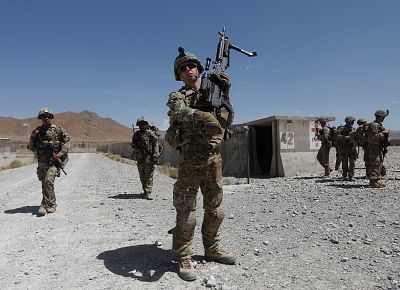Trump had made clear to his advisers earlier this year that he wanted to withdraw all troops from Afghanistan by the November 2020 election.
WASHINGTON — The Trump administration intends to announce the drawdown of about 4,000 troops from Afghanistan as early next week, according to three current and former U.S. officials. The withdrawal will leave between 8,000 and 9,000 U.S. troops in Afghanistan, the officials said.
The announcement comes just days after Special Representative for Afghanistan Reconciliation Zalmay Khalilzad rejoined diplomatic talks with the Taliban, which had broken down in September. On Thursday Amb. Khalilzad said the U.S. was "taking a brief pause" in talks after a Wednesday attack near Bagram Airfield killed two Afghan civilians and wounded 70 more.
The U.S. has between 12,000 and 13,000 troops in Afghanistan now. The officials would not say when the drawdown would begin, but did characterize it as a phased withdrawal that would occur over a few months. Two U.S. officials said the drawdown would be a combination of troops re-deploying early and others not being replaced when they rotate out.
In a statement, a spokesman for U.S. Forces-Afghanistan said, "U.S. Forces-Afghanistan has not received orders to reduce troop levels in Afghanistan. We remain fully committed to the Resolute Support mission and our Afghan partners, and focused on our key objective: ensuring Afghanistan is never again used as a safe haven for terrorists who threaten the United States, our allies or our interests."
President Donald Trump has pushed for a withdrawal from Afghanistan for some time, including during his recent visit to Afghanistan on Thanksgiving, his first as commander in chief.
Secretary of Defense Mark Esper told an audience at the Reagan National Defense Forum last weekend that the reduction of U.S. troops will happen even if the Taliban does not negotiate an agreement, and that the commander in Afghanistan, Gen. Scott Miller, has said he can sustain a reduction in forces.
"The commander feels confident we can go down to a lower level without jeopardizing our ability to ensure that Afghanistan doesn't become a safe haven for terrorism," Esper said, adding that he hopes to reallocate forces from CENTCOM to the Asia Pacific region, which he called his "priority theater."
The announcement of withdrawal is "part of trying to reset the talks with the Taliban," the former defense official said. Khalilzad can then propose to the Taliban that the two sides restart negotiations where they left off, with the U.S. withdrawing troops and the Taliban promising a ceasefire.
"This takes us to the minimum that you have to keep in the country to remain credible negotiating with the Taliban," the former official said.
In October Esper said the U.S. could decrease to 8,600 troops without affecting the counterterror operations.
The commander of U.S. Central Command, Gen. Frank McKenzie, participated in meetings Thursday to discuss the footprint for U.S. troops in the Middle East, according to three U.S. officials. The discussion also included talk of increasing the U.S. military footprint in other parts of the Middle East to counter the threat from Iran.
Trump has promised since campaigning for the White House in 2016 to end wars like the one in Afghanistan and reduce the number of U.S. troops deployed overseas. His advisers have over the past three years convinced him not to pull the plug on the Afghanistan mission, but the president showed a willingness to take such a step in October when he abruptly pulled U.S. troops out of Syria.
Trump had made clear to his advisers earlier this year that he wanted to withdraw all troops from Afghanistan by the November 2020 election.
"It's all about talking points in 2020," the former official said.
The White House declined to comment.












